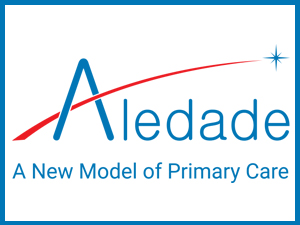
Paid Sponsorship by Aledade
By: Aledade’s Senior Vice President of Medical Affairs & Product Emily Maxson, MD
As a primary care physician, I often think about a compelling essay written by Michael Stein, MD, in the Washington Post. In his piece, Stein details the negative pressures today’s fee-for-service medicine system places on him – namely, the push to see as many patients as possible in a given day.
- Stein’s status as an employee of a large medical group where he is instructed to conform to the assigned length of the patient visit
- A need to react to the acute problems of the patients who come into the office thatday instead of acting proactively
- The (well-intentioned) desire to accommodate patients who want same- or next-day appointments.
But the fundamental issue with this approach is captured by Stein towards the middle of his essay. He writes, “[the] origin of the 15-minute visit is capitalistic, money tied to a clock… [the length of the average primary-care visit] remains driven by arbitrary 20th-century insurance service codes, based on diagnostic complexity, that dictate physician payment.”
The issues detailed by Stein are familiar for far too many primary care physicians – myself included. Working in fee-for-service medicine, I often find myself behind schedule, pressed to make up time during a “less complex” visit that may turn out to be every bit as nuanced. It is my privilege to spend a few extra moments with a patient to delve into the potential underlying environmental or personal causes of her condition, or tease out connections that would lead to more coordinated, more effective, care. But these extra moments are not always mine to give, and inevitably inconvenience the patients who follow.
In this way, the 15-minute visit structure sidelines the patient-physician relationship and becomes a zero-sum game – any excess time spent trying to improve one patient’s health through communication or a comprehensive approach to care means a patient later in the day might not receive the same attention, or might hold back explaining a problem, frustrated at the time they were kept waiting.
- Team-Based Care: All Aledade partner practices elevate team-based care and re-examine what can be accomplished by capable physician assistants, nurses, and other support staff. Engaging nurses and medical assistants as partners in quality care leads to fewer missed flu shots, improved coordination of care, better reconciled medication lists, fewer errors – and more time for the Aledade partner provider to connect more meaningfully with the patient.
- Medicare Annual Wellness Visits (AWVs): When a practice joins Aledade, one of our highest priorities is working with the physician and staff to bring in eligible patients for AWVs. AWVs, fully covered by Medicare with no costs to patients, leverage team based care and provide an opportunity for a physician and patient to discuss a patient’s risk for falls, depression, and a host of potentially significant health issues, and develop personalized care plans for problems before they become serious.
- Focusing on High-Risk Patients: We work with our partner practices to proactively identify – through electronic health records and claims data analysis – the highest-risk patients in a physician’s population. For these patients, we explore wrap-around approaches to care, examining external factors affecting health and integrating social services.
Each of these initiatives empowers physicians to spend more time thinking about the best way to care for patients, instead of worrying about the next appointment. As Stein writes, “[A] hurried, task-oriented approach doesn’t accommodate the meandering, overlapping, widening issues of patients.”
At Aledade, we partner with primary care physicians to help them build and lead ACOs. We want Aledade partner physicians to be focused on the complex ecosystem that each patient represents. So, we’re working to change the equation and add a few extra minutes to the clock.
To learn more about Aledade and the Aledade ACO currently being formed for independent primary care physicians in Ohio, contact Director of Strategic Provider Recruitment Beth Schindele or call 202.810.5685. For more information, you can also visit the Aledade website.





Or you can do Direct Primary Care and not worry about insurance metrics. Get paid directly by the patient you are caring about.